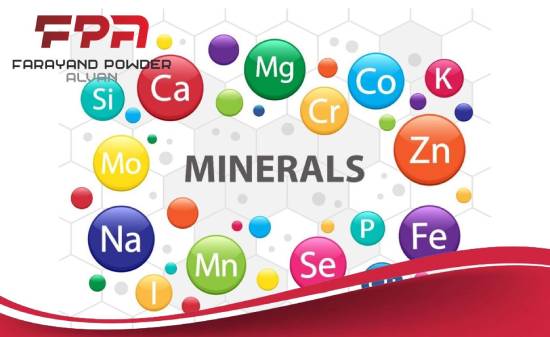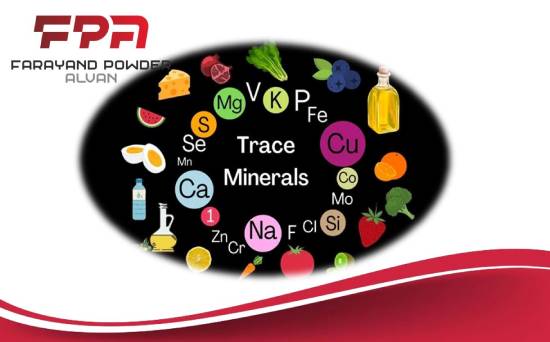Minerals play a pivotal role in maintaining optimal health, with their functions ranging from bone strength to nerve function regulation. However, one often overlooked aspect is their contribution to the body's defense systemIn this article, we explore the Functions of minerals in the body and mineral barrier against infection.
Understanding the Functions of Minerals
Minerals are essential micronutrients the body requires in small amounts for various physiological processes. They are involved in enzymatic reactions, hormone synthesis, and maintaining the body's pH balance. Without adequate minerals, vital bodily functions would be compromised.

Essential Minerals for Human Health
There are several essential minerals that the body cannot produce and must obtain through diet. These include Ground Calcium Carbonate, magnesium, potassium, talc, sodium, and trace minerals like zinc, iron, and selenium. But the 3 most important minerals for the body are calcium, iron, and zinc.
Roles of Minerals in Bodily Functions
Each mineral serves a unique purpose in the body. For instance, calcium is crucial for bone health and muscle function, while iron is necessary for oxygen transport. Similarly, zinc plays a role in immune function and wound healing, highlighting the diverse functions of minerals.
Key Minerals Involved in Immune Function
The human immune system serves as a guardian, defending the body against harmful pathogens and maintaining overall health. While several factors influence immune function, minerals play a crucial role in supporting its various mechanisms. These minerals serve as cofactors for enzymes involved in immune responses, regulate cellular signaling pathways, and contribute to the production and function of immune cells. Here, we delve into some of the key minerals involved in immune function and their significance in maintaining a robust immune system. In the following, we will check what the Functions of minerals in the body are against infection.

Zinc
Zinc is essential for immune function due to its involvement in numerous enzymatic reactions critical for cellular processes. It plays a pivotal role in the development and function of immune cells, including neutrophils, natural killer cells, and T lymphocytes. Zinc deficiency can impair both innate and adaptive immune responses, leading to increased susceptibility to infections. Additionally, zinc exhibits antioxidant properties, helping to combat oxidative stress and inflammation, further supporting immune function.
Iron
Iron is integral for various immune processes, particularly in the proliferation and differentiation of immune cells. It is necessary for the production of hemoglobin, which transports oxygen to tissues and supports energy metabolism in immune cells. Iron also contributes to the function of enzymes involved in DNA synthesis and repair, crucial for cell division and immune cell proliferation. However, excessive iron levels can promote oxidative damage and inflammation, potentially compromising immune function.
Selenium
Selenium is a trace mineral with potent antioxidant properties, primarily exerted through its incorporation into selenoproteins. These selenoproteins help regulate redox balance, modulate inflammatory responses, and support immune cell function. Selenium deficiency has been associated with impaired immune responses and increased susceptibility to viral infections. Conversely, adequate selenium intake can enhance immune function and improve host defense mechanisms against pathogens.
Copper
Copper plays diverse roles in immune function, serving as a cofactor for enzymes involved in antioxidant defense, collagen synthesis, and iron metabolism. It is crucial for the development and function of immune cells, including neutrophils, macrophages, and T cells. Copper deficiency can impair immune responses, leading to increased susceptibility to infections and impaired wound healing. However, excess copper levels can also be detrimental, promoting oxidative stress and immune dysregulation.
Magnesium
Magnesium participates in numerous biochemical reactions essential for immune function, including ATP production, DNA synthesis, and cell signaling pathways. It plays a crucial role in the activation and function of immune cells, such as macrophages, T cells, and B cells. Magnesium deficiency has been linked to immune dysfunction, inflammation, and increased susceptibility to infections. Adequate magnesium levels are necessary to support optimal immune responses and maintain overall health.
Calcium
While primarily known for its role in bone health and muscle function, calcium also contributes to immune regulation and host defense mechanisms. It functions as a signaling molecule in immune cells, modulating various cellular processes, including activation, proliferation, and cytokine production. Calcium deficiency can impair immune responses and compromise the integrity of the immune system. However, excessive calcium levels can disrupt immune function and promote inflammation.

How Minerals Support Immune Health
Minerals play a multifaceted role in supporting immune health. They help enhance the function of immune cells, regulate inflammatory responses, and combat oxidative stress, thereby fortifying the body's defenses against pathogens.
Enhancing Immune Cell Function
Minerals such as zinc and selenium are essential for the proper functioning of immune cells, including neutrophils, macrophages, and lymphocytes. By optimizing immune cell activity, minerals help the body mount a robust defense against infections.
Antioxidant Properties
Many minerals, including selenium and zinc, possess antioxidant properties that help neutralize harmful free radicals. By reducing oxidative stress and inflammation, these minerals contribute to overall immune function and resilience.
Strategies for Maintaining Optimal Mineral Levels
Ensuring adequate intake of minerals is vital for supporting immune health and preventing deficiencies. Incorporating nutrient-rich foods into the diet and, if necessary, supplementing with specific minerals can help maintain optimal levels.
Dietary Sources of Minerals
A balanced diet that includes a variety of fruits, vegetables, whole grains, lean proteins, and dairy products is essential for meeting mineral needs. Foods rich in zinc include meat, shellfish, legumes, nuts, and seeds, while iron can be found in red meat, poultry, fish, and fortified cereals. Selenium-rich foods include Brazil nuts, seafood, poultry, and eggs.

Supplements and Their Role
In some cases, dietary supplements may be necessary to ensure adequate intake of certain minerals, especially for individuals with specific dietary restrictions or increased nutrient needs. However, it's essential to consult with a healthcare professional before starting any supplementation regimen to avoid excess intake or potential interactions with medications.
Conclusion
In conclusion, minerals are not only essential for basic bodily functions but also play a critical role in supporting immune health. By acting as a barrier against infections, minerals like zinc, iron, and selenium help fortify the body's defenses and promote overall well-being. Ensuring adequate intake of these vital nutrients through diet and supplementation, if necessary, is key to maintaining optimal immune function and warding off diseases.
With over 30 years of experience in producing various industrial micronized powders and an experienced team with extensive knowledge of pigments, Farayand Powder Alvan Co. has been a reputable supplier in various industries and is honored to provide technical consultation to customers for the best and most economical solutions.


